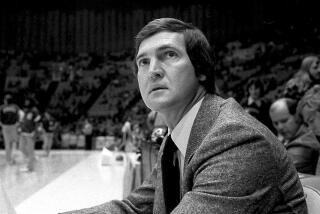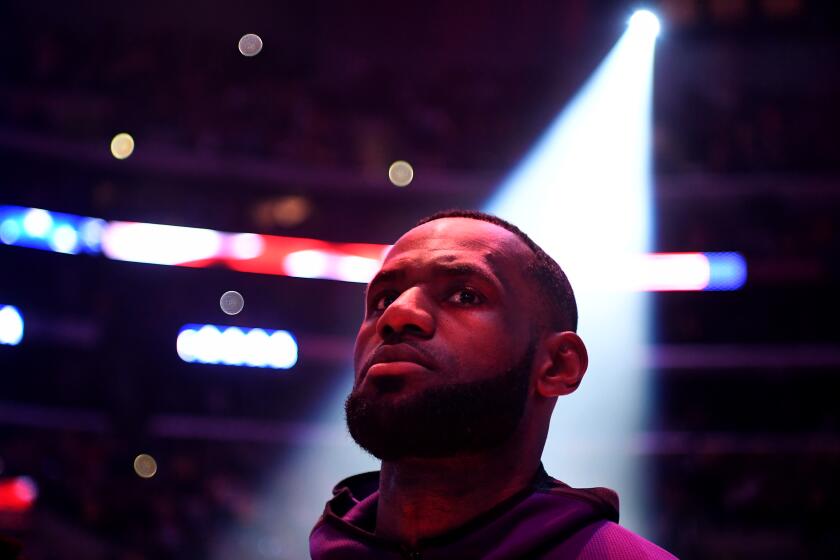His dance moves made him part of Lakers’ show
- Share via
A transplanted New Yorker carved a special niche for himself in the Lakers’ Showtime era of the 1980s, his kinetic energy and unbridled flair repeatedly sending the oft-placid Forum faithful into a frenzy. Though neither a scorer, playmaker nor lockdown defender, he nevertheless retained an uncanny ability to bring dormant fans out of their seats and ignite game-changing rallies.
But then Dancing Barry just stopped showing up. Sixteen years ago this month, he says, he walked away, never to shimmy down an aisle for the Lakers again.
“It stopped being fun,” he says.
Two years ago, when the Lakers played host to a 20-year reunion of their 1985 championship team, he declined an invitation to attend.
“They really didn’t treat me good,” he says of the Lakers.
Now using the stage name Magic Barry -- “I’m a professional magician,” he says, “but I couldn’t be Magic Barry in Los Angeles because they already had Magic Johnson” -- he lives outside Charlotte, N.C., and danced for a short time at Hornets games before the team moved to New Orleans four years ago.
He works as a territorial manager and trainer for a veterinary laboratory, selling lab services and training vets on how to promote their businesses.
Very little of his time, he says, is devoted to performing.
“Charlotte is not a great show business city,” he says.
He is married and, based on his comments, probably in his mid-50s. “That, I can’t reveal,” he says of his exact age. “I can’t disappoint my fans.”
Though charming and funny when discussing his Dancing Barry days, he declined to sit for an up-to-date photo -- “I don’t want to ruin anybody’s memories,” he says -- and is reluctant to say much about his personal life.
“I’ve still got to worry about people who might feel that I did them wrong,” he says. “I don’t want guys to come looking for me. L.A. has a bunch of crazy people there. You’re not putting my last name in there, are you? I assume you would protect the health of the people you’re writing about.
“I don’t want anyone dangerous to come looking for me.”
He is still spooked, he says, by an altercation with a “crazy fan” from 21 years ago. Performing at an NBA Finals game between the Houston Rockets and Boston Celtics at Houston in 1986, he says he was accosted by a fan who grabbed him, shook him and shouted, “You traitor, you traitor. I’m going to get you.”
Barry’s alter ego was created in April 1975 in Houston, where Barry went to college, and was based on a man who called himself Dancin’ Harry and performed at games, including the New York Knicks matchups at Madison Square Garden.
“He was a black guy who wore a big, sloppy beret and a cape,” says Barry, who grew up in the Bronx. “He would go out on the baseline and put like a hex on the opposing team. He was very well known at the Garden.”
Barry at the time was taking dance lessons “to meet girls,” he says. But when the Rockets and the Knicks met in the first round of the 1975 playoffs, friends urged him to test his moves at Hofheinz Pavilion, “to counteract Dancin’ Harry.”
And when the Rockets cut into a big Knicks lead, he says, “The fans started going crazy and I ran out and started dancing. I became Dancing Barry.”
In 1982, after dancing at Rockets and Astros games for several years and at a handful of Knicks games in New York, the longtime basketball fan moved to Los Angeles, where naturally he gravitated to Lakers games at the Forum.
Though the Lakers were winners, “The games were surprisingly unexciting,” he says. “Somebody said to me, ‘We’re laid back.’ I didn’t know what that meant, so I got a dictionary. And laid back, you know what it means? Boring....
“I said to myself, ‘This is my shot to revive Dancing Barry.’ ”
In March 1983, he says, during a fourth-quarter timeout in a game matching the Lakers and the Dallas Mavericks, Dancing Barry made his Forum debut.
“It was so intimidating, how quiet it was,” he says. “I was like a whirling dervish, dancing around for about 30 seconds. The place went crazy. The Lakers came out of the timeout, ripped off eight points in a row and won going away.”
For the next seven full seasons, into the early ‘90s, Dancing Barry was a Forum fixture in his white tuxedo, his brief but electrifying performances adding an air of spontaneity and revelry to the party atmosphere that was a Showtime staple. At first, he says, the Lakers paid him $35 a game, same as what they were paying the Laker Girls. Later, when the Clippers said they’d pay him $200 to dance exclusively for them, the Lakers reluctantly matched the offer, he says, “but every year after that they refused to give me even a single penny more.”
In 1991, Dancing Barry decided it was time to waltz away.
“They never even said, ‘Thank you, Barry, goodbye,’ ” he says. “Never said a thing. I just stopped going and that was it. They never even cared.”
But it was fun while it lasted.
“I made a lot of people laugh, a lot of people told me it was great,” he says. “I had a seven-year run with the Lakers, in supposedly the entertainment capital of the world, and no one supplanted me. They never came up with anything better. I’ve got Chick Hearn on tape saying, ‘This guy is winning games for us. This guy’s worth coming to see.’ That’s the best thing I have. I’ve got the videotapes.”
More to Read
All things Lakers, all the time.
Get all the Lakers news you need in Dan Woike's weekly newsletter.
You may occasionally receive promotional content from the Los Angeles Times.






